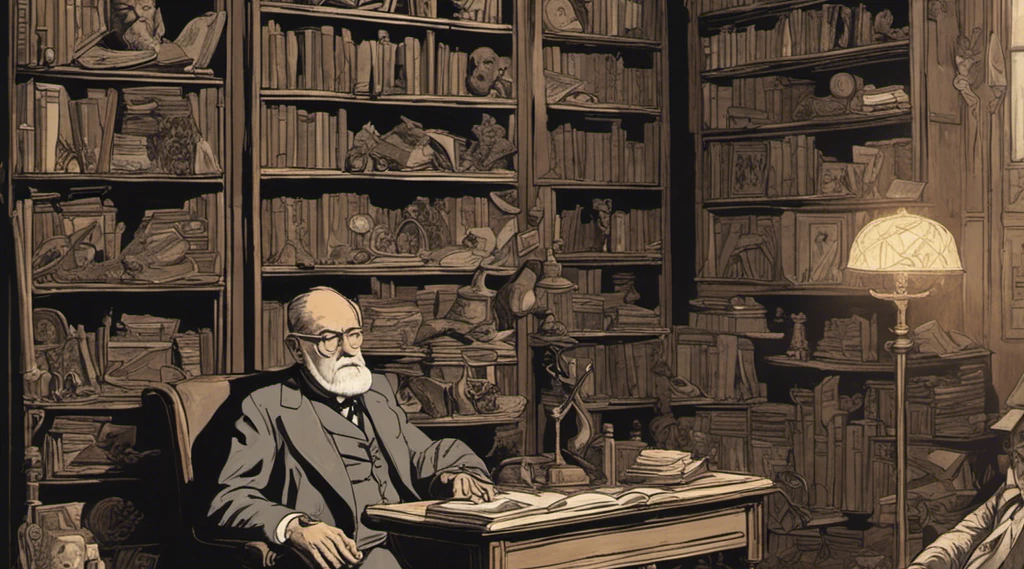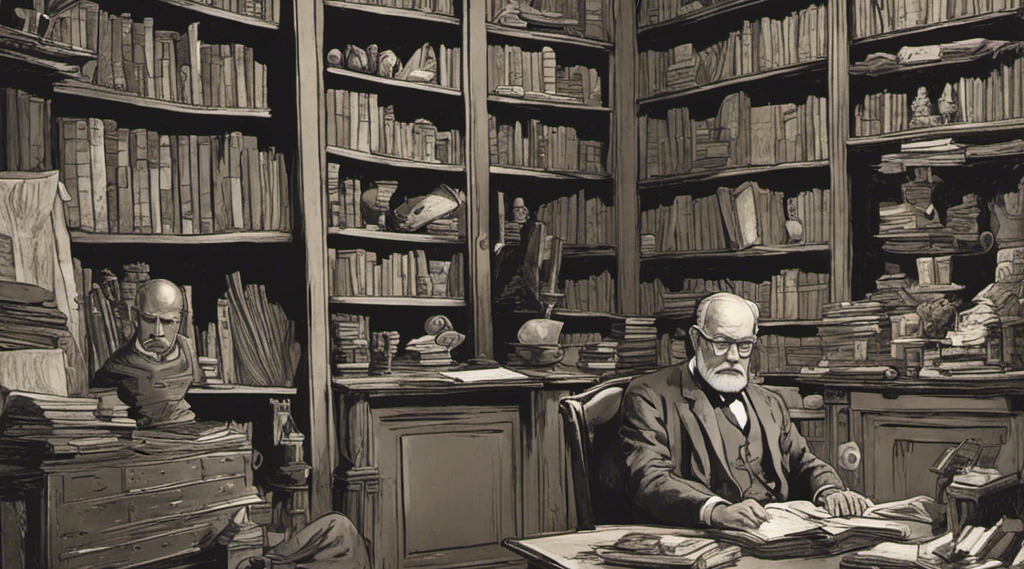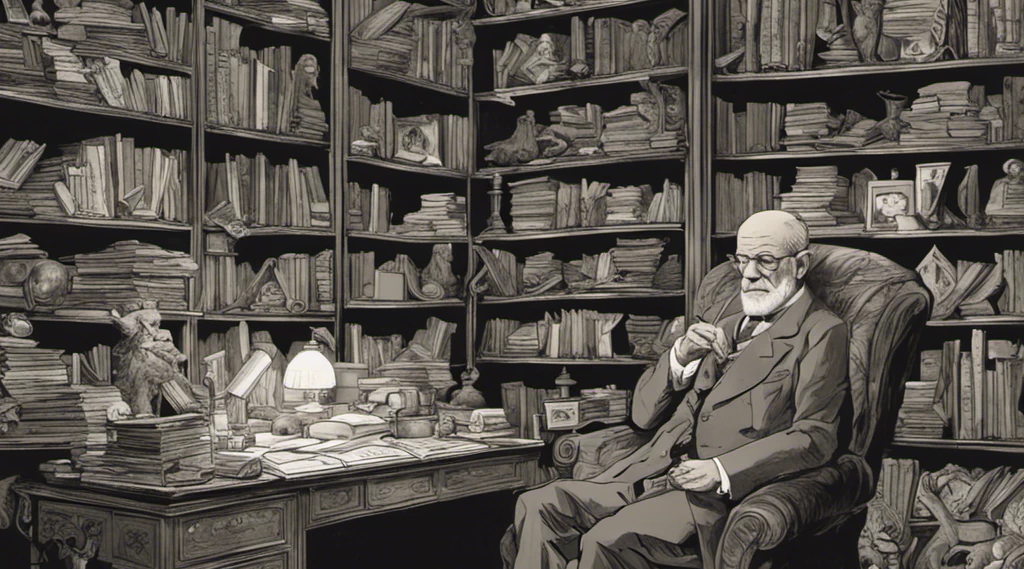Freud: A Life for Our Time
Freud: A Comprehensive Exploration of the Pioneer of Psychoanalysis and his Revolutionary Ideas on the Human Mind.
Chapter 1 What’s the Book Freud
"Freud: A Life for Our Time" is a biography written by Peter Gay, a renowned historian and scholar. Published in 1988, the book explores the life and work of Sigmund Freud, the Austrian neurologist who is widely regarded as the founder of psychoanalysis.
In this comprehensive biography, Peter Gay delves into Freud's personal and professional life, tracing his childhood, his studies in medicine, and his groundbreaking theories on the human mind and behavior. The book provides an in-depth examination of Freud's major contributions to psychology, including concepts such as the unconscious mind, dream analysis, and the Oedipus complex.
"Freud: A Life for Our Time" not only explores Freud's significant impact on the field of psychology but also delves into the cultural and historical context of his work. It discusses the controversies surrounding his theories and the influence they had on society at large. Peter Gay offers a balanced perspective on Freud's life and ideas, providing readers with a nuanced understanding of the man behind the revolutionary theories.
Overall, "Freud: A Life for Our Time" serves as an excellent resource for those interested in learning about Sigmund Freud's life, his contributions to psychology, and the enduring legacy of psychoanalysis.
Chapter 2 Is Freud A Good Book
According to reddit comments on Freud, "Freud: A Life for Our Time" by Peter Gay is generally regarded as a highly respected and influential biography of Sigmund Freud. It offers comprehensive insights into the life and work of one of the most prominent figures in the field of psychology. Whether it is considered a good book depends on individual interests and preferences. If you have an interest in psychology, psychoanalysis, or the life of Sigmund Freud, this book may provide valuable information and analysis. It's always recommended to read reviews, summaries, or sample chapters to determine if it aligns with your specific interests before deciding to read it.
Chapter 3 Freud Abstract
In this article, we delve into the fascinating world of Sigmund Freud's theories and ideas, as summarized by renowned Freudian scholar, Peter Gay. Unraveling the enigmatic mind of Freud, we explore his groundbreaking concepts on psychoanalysis, dream interpretation, sexuality, and the unconscious. Through Gay's expert analysis, we gain valuable insights into Freud's contributions to psychology and his lasting impact on the field. Join us on this intellectual journey as we explore the depths of the human psyche through the lens of Freud's revolutionary work.
Chapter 4 Freud’s Author
The book "Freud: A Life for Our Time" was written by Peter Gay, a renowned historian and author. It was first published in 1988.
Peter Gay has written several other notable books on various topics, particularly in the field of intellectual and cultural history. Some of his well-known works include:
- "The Enlightenment: An Interpretation" (1966)
- "Weimar Culture: The Outsider as Insider" (1968)
- "The Bourgeois Experience: Victoria to Freud" (5 volumes, published between 1984 and 1998)
- "Mozart: A Life" (1999)
Among these books, "The Enlightenment: An Interpretation" is widely regarded as one of Gay's most significant works. This book provides a comprehensive analysis of the Enlightenment era, exploring its key ideas, figures, and social impact.
In terms of editions, the best version of any book is subjective and may depend on personal preferences or specific requirements. However, newer editions often incorporate revisions and updates based on new research or developments in the field. It is always advisable to choose the latest edition available when looking for a book.
Chapter 5 Freud Meaning & Theme
1. What does Freud Mean
"Freud: A Life for Our Time" is a book written by Peter Gay, which serves as a comprehensive biography of Sigmund Freud, the renowned Austrian neurologist and the founder of psychoanalysis. The title suggests that Freud's life and work are relevant and significant even in contemporary times.
The meaning behind this title can be interpreted in several ways:
- Relevance of Freud's ideas: Despite being published in 1988, the notion that Freud's theories and concepts have lasting relevance for our understanding of human psychology and behavior is emphasized. It suggests that Freud's insights continue to be applicable today, serving as a foundation for many modern psychological theories and therapeutic approaches.
- Historical context: By focusing on Freud's life, the book places his work within the framework of his personal experiences, struggles, and intellectual journey. Understanding Freud's life helps us appreciate the historical and cultural context in which he developed his groundbreaking ideas.
- Applicability to contemporary issues: The title implies that Freud's theories can shed light on present-day concerns and challenges. It suggests that his ideas have the potential to address and illuminate various aspects of human existence, such as relationships, sexuality, dreams, and the unconscious mind, which continue to captivate people across generations.
In summary, "Freud: A Life for Our Time" suggests that Freud's life and work have enduring relevance and offer valuable insights into the human psyche, making them meaningful and applicable in both historical and contemporary contexts.
2. What’s the Theme of Freud
"Freud: A Life for Our Time" is a captivating exploration of the life, work, and enduring impact of Sigmund Freud, one of the most influential figures in the field of psychology. This theme delves into various aspects of Freud's life and his contributions to our understanding of the human mind.
- Pioneering the Unconscious Mind: Freud revolutionized the field of psychology by introducing the concept of the unconscious mind. His groundbreaking theories on dreams, free association, and psychoanalysis unveiled the hidden motivations and desires that shape human behavior. The theme can focus on how Freud's ideas challenged conventional thinking and laid the foundation for future developments in psychology.
- Understanding Human Development: Another significant aspect of Freud's work was his emphasis on psychosexual development. The theme can explore how Freud proposed stages such as oral, anal, phallic, latency, and genital, highlighting their influence on personality formation. It could also delve into the controversies surrounding these theories and their continued relevance in contemporary psychology.
- The Role of Childhood Experiences: Freud believed that childhood experiences played a crucial role in shaping an individual's personality and behaviors. This theme can delve into Freud's concept of the Oedipus complex, the role of early attachments, and the unresolved conflicts that can surface in adulthood. It can highlight the ongoing debates about the validity of these ideas in light of more recent research.
- Psychoanalysis as a Therapeutic Approach: Freud's therapeutic technique, known as psychoanalysis, aimed to uncover repressed memories and unresolved conflicts by delving into the patient's unconscious mind. This theme can explore the principles of psychoanalysis and its impact on the field of therapy. It can discuss the therapeutic benefits and criticisms of this approach and its adaptation in modern-day counseling practices.
- Freud's Cultural Impact: Freud's influence extends beyond the realm of psychology. This theme can focus on how his ideas have permeated various aspects of society, including art, literature, film, and popular culture. It can explore Freudian symbolism and themes in works of renowned artists, writers, and filmmakers, emphasizing the lasting legacy of his theories.
- Freud's Personal Life: While primarily focusing on his professional contributions, this theme can also touch upon Freud's personal life and struggles. As a Jewish psychoanalyst living through challenging times, his experiences with anti-Semitism and exile shaped his worldview. This perspective can shed light on both the man behind the theories and the historical context in which he operated.
Overall, "Freud: A Life for Our Time" offers an engaging exploration of Sigmund Freud's life and ideas, allowing readers to delve into the realm of the unconscious mind and its profound impact on our understanding of human behavior and psyche.
Chapter 6 Engaging in Online Research on Freud
If you're a passionate reader constantly seeking fresh book recommendations, you're in for a treat! We have an array of exciting options to share with you. For those intrigued by the book Freud and its various formats and concise summaries, we suggest exploring platforms like Bookey. Bookey offers a wide selection of books in different formats along with short summaries, providing a quick overview of the content. This is a perfect solution for individuals desiring comprehensive insights without investing excessive time. If you're keen on delving into social commentary surrounding this book, we highly recommend visiting reddit. Reddit hosts numerous discussions on Freud, such as the engaging "Sigmund Freud can eat a bag of dicks" thread, where you can gain multiple perspectives. Although we are unable to provide a PDF version of Freud here, our foremost objective is to guide you towards resources that will greatly aid your understanding of the book's principles and strategies. By leveraging these invaluable resources, you will acquire the necessary insights from "Freud" to embark on a journey of entrepreneurship and extraordinary growth.
Chapter 7 Freud’s Quotes
Freud quotes as follow:
- "The ego is not master in its own house." - Sigmund Freud
- This quote emphasizes the idea that our conscious mind is not always fully aware or in control of our thoughts and actions. It highlights the influence of our unconscious mind on our behavior.
- "Dreams are the royal road to the unconscious." - Sigmund Freud
- Freud believed that dreams provide valuable insight into the unconscious mind, allowing us to explore repressed desires and unresolved conflicts. He saw dream analysis as a means of uncovering hidden meanings.
- "Where id was, there shall ego be." - Sigmund Freud
- This quote refers to the three components of the mind according to Freud's structural theory: id, ego, and superego. It suggests that the ego, which represents reason and reality, should take over the primitive and instinctive drives of the id.
- "Sometimes a cigar is just a cigar." - Sigmund Freud
- This statement is often attributed to Freud, though it is disputed whether he actually said it. It implies that not everything has a deeper symbolic meaning, contrary to his emphasis on symbolism in psychoanalysis.
- "Unexpressed emotions will never die. They are buried alive and will come forth later in uglier ways." - Sigmund Freud
- According to Freud, repressing emotions can lead to psychological distress. This quote underscores the importance of acknowledging and expressing one's feelings rather than suppressing them.
- "It is impossible to escape the impression that people commonly use false standards of measurement — that they seek power, success, and wealth for themselves and admire them in others, and that they underestimate what is of true value in life." - Sigmund Freud
- This quote reflects Freud's critique of society's tendency to prioritize material possessions and external achievements over more meaningful aspects of life, such as relationships and personal growth.
Please note that these quotes are attributed to Freud but may be paraphrased or translated in different ways.
Chapter 8 Similar with Freud
If you enjoyed reading "Freud: A Life for Our Time" by Peter Gay, you might be interested in exploring other books that delve into the life and work of Sigmund Freud or provide insights into the world of psychoanalysis. Here are a few suggestions:
- Frida:A Biography of Frida Kahlo by Hayden Herrera: This biography delves into the life of Frida Kahlo, exploring her tumultuous personal journey, her indomitable spirit, and her profound impact on the art world.
- "Freud:An Intellectual Biography" by Joel Whitebook: This biography provides a comprehensive exploration of Freud's life, focusing on his intellectual development and the evolution of his ideas throughout his career.
- "The Freud Reader" edited by Peter Gay: If you're seeking a collection of Freud's key writings, this book is an excellent choice. It includes a selection of his most important papers spanning various topics, allowing readers to gain a deeper understanding of his theories.
- "Freud: The Making of an Illusion" by Frederick Crews: This critical examination challenges some of Freud's ideas and discusses the controversies surrounding his work. It provides an alternative perspective on Freud's life and legacy.
- "The Diary of a Young Girl" by Anne Frank - A powerful and poignant account of Anne Frank's experiences as a Jewish teenager hiding from the Nazis during World War II.
Remember, each author may present different perspectives on Freud and his ideas. Exploring multiple sources can provide a well-rounded understanding of his work and its impact on psychology.





